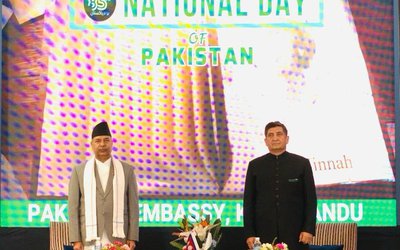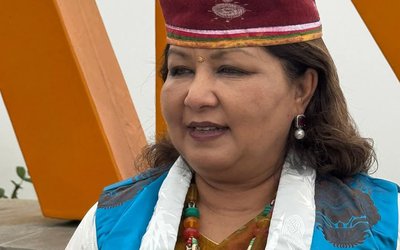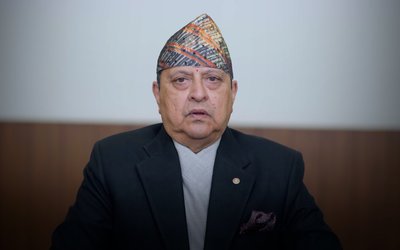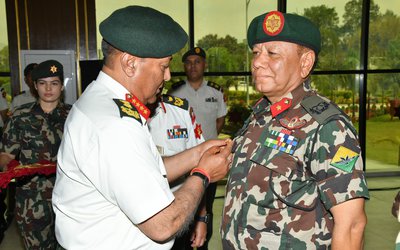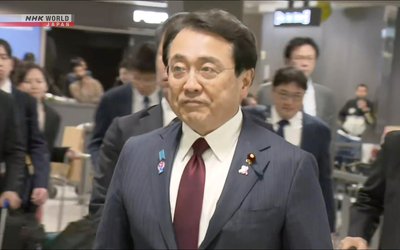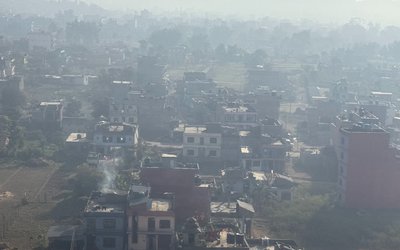
As former chief justice Nayan Bahadur Khatri is celebrating his 99th birthday this fortnight, Nepal’s judiciary is witnessing a series of turmoil that threaten to shake its foundations built over six decades ago. Nepal is replacing its oldest Civil Code (Muluki Ain) with a new one after one and a half century.
As the longest serving chief justice, in a relatively stable judiciary, Khatri would not have imagined the present, an unstable and shaken judiciary, with three justices facing accusations on manipulation of their academic certificates, in just a matter of three months.
Retired over 35 years ago, former chief justice Khatri is a living history of Nepal’s judicial transformation. Had he been keeping tab on the current state of judiciary, he would feel more pain.
Whether it was the international political case of B.P. Koirala, or an issue of fundamental rights, or the case of KI Singh, or Ram Raja, for that matter, former chief justice Khatri, who was in the Supreme Court of Nepal in a crucial period between 1960 and 1985, delivered a number of landmark constitutional verdicts. If one reads his verdicts on the political cases, he or she can see his depth of legal knowledge and conviction towards the rule of law and liberal political system.
Although current Supreme Court is constitutionally more independent than that of the past, the apex court seems to be no match with the Khatri-led Supreme Court in terms of delivering justice.
With over two and a half decades of career in Supreme Court and earlier decade in legal department, former chief justice Khatri was, in one or the other way, involved in drafting of five constitutions starting from Nepal Government Act 1949 to Constitution of Kingdom of Nepal 1990.

Published nine years ago, former chief justice Khatri’s own memory Mero Jeevan Yatra, Anubhab ra Anubhuti (My Life’s Journey: Experiences and Perceptions), disclosed so many interesting events and facts of several decades of political, social, cultural, legal fronts of Nepal. The book also showed the transformation of Kathmandu’s social, cultural, religious and natural landscapes as he remained a part of all transformations. From the life of common people and elite rulers of Kathmandu Valley, social relations, power centers of early days of Rana period and Nepal in the later stage, Khatri provided a vivid description of Nepal. However, many see the book is just a drop of the sea of justice Khatri actually delivered.
“The book is just a drop of the sea. He should have written many more as he knew many ins and outs of Nepal,” said senior advocate Badri Bahadur Karki, who also practiced in the bench of former chief justice Khatri.
In his tenure as a justice of Supreme Court, up to serving as the Chief Justice, he delivered several landmark constitutional verdicts. Among them, the habeas corpus of 1971, which was popularly known as Yagya Murti Banjade Vs the government, is still regarded as a masterpiece and widely cited as the precedence in Nepal’s judicial history in the cases related to individual freedom.
Senior advocate and eminent constitutional lawyer late Ganesh Raj Sharma led a case, pleaded by senior advocate Kusum Shrestha and Krishna Prasad Bhandari, declaring Yagya Murti Banjade’s detention was illegal and demanding habeas corpus.
Former prime minister Sher Bahadur Deuba, Ram Chandra Poudel, Bipin Koirala, Shiva Bahadur Khadka were the beneficiaries of Khatri’s landmark decision. This decision paved the way to register present Nepal Students Union of Nepali Congress and All Nepal Free Students Union of Communist Parties.
His verdict on the defamation case of Sarbgya Ratna Tuladhar Vs Rashtriya Panchayat was another landmark judicial verdict. The verdict delivered by a five-member full bench headed by chief justice Khatri interpreted Rashtriya Panchayat as a body without legislature power.
This constitutional verdict created so a hue and cry in Rashtriya Panchayat and cost him his extension for chief justice and paved the way to Dhanendra Bahadur Singh to become chief justice. After the delivery of this verdict, chief justice Khatri’s relations with Palace administration deteriorated at the level that he did not get the extension of tenure.
Although his book has not touched on the Constitution of Nepal 2015, some provisions of the current constitution, claimed as more liberal, seems short in view of his verdicts delivered during Panchayat days on the fundamental rights of citizen.
Serving as the chairperson of Press Council Nepal, Khatri also dealt with Nepali press. During his tenure, the Council introduced the code of conduct for the media.
Khatri took the charge of chief justice when the court was overcrowded with political cases of banned Nepali Congress and Communist Party leaders and workers.
Cases of BP Koirala, Ganesh Man Singh, Rishikesh Shaha, KI Singh, Ram Raja Prasad Singh, Communist leader Manmohan Adhikary were handled by the benches headed by chief justice Khatri. He always delivered his verdicts against the government, giving assurances to the people that judiciary was impartial and in favor of individual freedom and political rights.
He ordered the release of many political prisoners, issuing habeas corpus and mandamus. Out of many younger lawyers who pleaded the political cases in his bench, only a few of them are alive: senior advocates Kushum Shrestha, Krishna Prasad Bhandari, Sindhunath Pyakurel, Daman Nath Dhungana and Sarbagya Ranta Tuladhar are alive but not active. Active senior advocates of the time are Badri Bahadur Karki, Bishwokanta Mainali, Subhash Nembang, Dr. Surya Dhungel, MahadevYadav, and Radhe Shyam Adhikari, Harihar Dahal and Prakash Wasti.
Many renowned constitutional lawyers like Sambhu Prasad Gyawali, Krishna Prasad Ghimire, Krisnha Prasad Panta, Bashudev Dhungana, Moti Kazi Sthapit and Ganesh Raj Sharma, who pleaded in his bench, are no more.
Khatri, who was born in Kupundole and now living in Manbhawan, also settled several cases related to BP Koirala, ordering his release. He issued orders to release BP Koirala from unauthorized prison from time to time. In his book he also describes many references and verdicts he delivered as the judge.
An eyewitness of Nepal’s political, social and judicial transformation of over last 9 decades, former chief justice Khatri has made immense contributions to Nepal’s legal sector. During his career as a justice of Nepal’s apex court, Khatri always stood for the rule of law and liberal order and his verdicts were his testimony.
With landmark precedents, which lawyers cite during their pleading of the cases and judges cite while giving verdicts, his name is on top in the judicial history of Nepal. But, among his six sons and daughters and fifteen grand children, nobody is in legal practice to follow the legacy of the legendary man. Although one of his sons studied law, he is not in practice. One of his sons and a daughter have already died.
Despite being in a weak and unstable political period, the people have some faith in the judiciary, for it has traditions going back to predecessors like Khatri.
One does not need to praise justices and judges for their verdicts, or precedents, which speak by themselves. If one goes through the verdicts on civil rights, former chief justice Khatri firmly stands tall on his convictions.
Ninety-nine year old former chief justice Khatri rarely has any contact with his current fraternity and colleagues. However, his family members said that he still attaches great faith on a profession on which he has spent his entire life.

His involvement in the legal system was not for nothing. Sent to Lucknow University to Complete MA in Economics, he returned to Nepal with two degrees, MA in Economics and Bachelor in Law (MA, BL). According to his biography, Khatri’s first choice was to be an economics teacher at Tri Chandra College.
Coincidently, Khatri was asked to work in Rana’s court and later on then Prime Minister Padma Sumsher asked him to work in a committee which drafted the first constitution for Nepal.
After the completion of work and Padma Sumsher’s voluntary retirement from power, the last Rana Prime Minister Mohan Sumsher Rana appointed him Major of Nepal Army, with a deputation of Nepali Wakil (consulate general to Lhasa). He served there for almost three years till 2008.
During the Rana period, normally the foreign relations used to be under the military wing of prime minister. Khatri, who joined as a civilian in Rana’s civil service, was transferred to Army to secure new post in the diplomatic mission.
He was also an eyewitness of the Tibetan Upsurge and the march of China’s People’s Liberation Army to Lhasa. Khatri presented his credentials to Dalai Lama and Chinese official representatives as a diplomat from Nepal’s court. His grand-daughter Neelu Thapa recalled her grandfather’s sharp memory till writing the book. However, his memory has faded in recent years.
Almost 37 years later, former chief justice Khatri was appointed the Royal Nepalese Ambassador to China by King Birendra. Khatri served there for four full years of his tenure as a Nepalese ambassador to People’s Republic of China.
Although former chief justice Nayan Bahadur Khatri joined Nepal’s civil service during the autocratic Rana Rule, he retired in an experiment of four constitutions.
MA and BL of Lucknow University of India, former Justice Khatri was also a well read person of Nepal’s Legal Code (Muluki Ain).
With the legal education and higher education from liberal Indian University, Justice Khatri’s verdict and legal opinion were always inspired by his study and university as he described in his memoir. Graduating in law from Lucknow University, he completed his MA in Economics and Sociology from the same University
In his biography, Khatri narrates his life from joining the bureaucracy during the period of Padma Sumsher Rana and joining the team of drafters of the first constitution of Nepal in 2004.
For his contribution to drafting the 2004 constitution, former chief justice Khatri was rewarded with a positing in Consulate General’s Office or Nepal’s Mission of Lhasa Tibet.
In his late days, former chief justice Khatri, founder chairman of National Human Rights Commission, continued his verdicts following his own standards.
Former chief justice Khatri always stood strongly in favor of liberal ideas and rule of law and his book is his testimony to his commitment to liberal values and rule of law.
As Khatri celebrates his 99th birthday, Nepal’s judiciary and judicial system, under stress at present to maintain its independence and impartiality, should turn a leaf of its history back to the time of former chief justice Khatri for some inspiration.

Keshab Poudel
Poudel is the editor of New Spotlight Magazine.
- KUL MAN GHISING: Bowing Down To The People
- Apr 13, 2025
- POLITICAL VIOLENCE: Culture of Impunity
- Apr 11, 2025
- PM OLI MEETS PM MODI: No Progress
- Apr 09, 2025
- PM OLI’S THAILAND VISIT: Flip Flop
- Apr 08, 2025
- FM Dr. Deuba’s India Visit: Mission Aborted
- Mar 26, 2025

